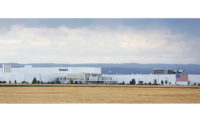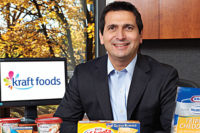Worldwide sales and marketing
Chobani, however, is more than a U.S. brand. In November 2011, the company began selling yogurt in Australia and Canada, due to “an outpouring of requests” from both countries, Ulukaya said. This year it entered the United Kingdom.
The company introduced seven flavors Down Under — peach, blueberry, strawberry, vanilla, mango, passion fruit and pineapple — to Woolworths stores in New South Wales. In 2011, it bought Bead Foods Pty Ltd., an Australian maker and distributor of dairy brands, including Gippsland Dairy. Australian’s taste for yogurt is increasing. Chobani (citing statistics from Retail Media’s MediaWorld 2010 Annual Report) said the yogurt category in that country is valued at AU$937 million and increased 7.6% from 2009 to 2010.
In Canada, Chobani offers five flavors (black cherry, strawberry, peach, pomegranate and plain) at Loblaw stores in Toronto and Hamilton.
Here in the United States, Chobani sells to grocery stores (including Safeway, Royal Ahold, Supervalu and Kroger banners), drug stores (Walgreen’s and CVS) and mass merchandisers (including Target and Wal-Mart) nationwide. The yogurt is available in a variety of formats. Twelve nonfat and five low-fat flavors are sold in 6-ounce cups (suggested retail price of $1.29). Nine blended flavors are sold in 16-ounce containers ($3.29), and four flavors in 32-ounce containers ($5.99). Chobani “Flip” is sold in two flavors in 5.3-ounce “flip” packages, which have a separate compartment for inclusions.
Chobani uses an authentic straining process to make its Greek yogurt, and uses milk from cows not treated with the synthetic artificial growth hormone rBST. All Chobani products are gluten-free and Kosher-certified, and provide two times more protein than regular yogurt. It adds the live and active cultures Lactobacillus bulgaricus and Streptococcus thermophilus. The yogurt is not heat treated after fermentation so the custom-blended cultures remain alive and viable throughout the products’ shelf life, according to the company. It adds three types of probiotic cultures to the yogurt: Lactobacillus acidophilus, Bifidus and Lactobacillus case.
Chobani Champions, launched in 2010, is a line extension developed for children. At the launch, Chobani called it the “first Greek yogurt in the United States made exclusively for children’s tastes.” The 3.5-ounce packages (a portion size that Chobani deems appropriate for the age group) are available in mixed-berry, orange-vanilla, banana-honey and vanilla chocolate chunk flavors. Made with low-fat milk, one serving of the yogurt has 100 to 120 calories. A four-pack sells for $2.99.
Chobani opened its first retail store in New York City in July this year. Called Chobani SoHo and located in Manhattan’s SoHo neighborhood, the store sells branded yogurt in 6-ounce and 32-ounce packages, made-to-order yogurt creations with seasonal inclusions and non-dairy items, including seasonal fruits, oils, nuts, granolas and bottled water.
The store allows Chobani to test-market flavor combinations with fans and garner immediate feedback about preferences. The toasted coconut and pineapple offering is made with coconut flakes, fresh pineapple, agave syrup and hazelnuts. Another menu item combines Turkish pistachios, dark chocolate, clover honey, oranges and mint leaves. The yogurt creations sell for $4.25, including tax.
Perhaps Chobani’s biggest marketing initiative this year was its sponsorship of the United States Olympic team and six U.S. Olympic and Paralympic athletes. In an agreement which runs through 2014, Chobani is the official packaged yogurt provider to the USOC and Team USA. The company made its yogurt available to every athlete living or training at the U.S. Olympic Training Centers in Colorado Springs, Colo., Chula Vista, Calif., and Lake Placid, N.Y. In London, during the games, Chobani was served at the USA House and High Performance Training Center.
Television, digital and out-of-home ads featuring the athletes ran during the Olympic Games this summer. Former Olympics and professional softball pitcher Jennie Finch stars in a current television advertising campaign for Chobani Champions, the line of yogurts geared for children. (One of Finch’s children appears with her in the spots.)
The company made a stir in 2011 with a campaign called “Real Love Stories.” It was Chobani’s first national ad program and featured real fans of the products. One, a pre-med student, bicycled 80 miles from his college to New Berlin, N.Y., just to see the Chobani manufacturing facility. Another spot involved a woman in Virginia who hid her Chobani lunch to prevent co-workers from stealing it out of the office refrigerator.
Last year’s marketing campaign for Chobani Champions used technology to engage children, with an app called Champlify. Collectable ChampTag medals were placed under the lid of individual Champions’ yogurt packages. The lids contained a unique code that brought the image to life in 3-D when viewed using a proprietary smart phone mobile application.
While all these efforts are geared to promote the Chobani brand, the company also wants to grow the overall category. The processor welcomes “competitors if they produce a good, quality product that gets people eating and enjoying yogurt,” O’Brien said.
But what is more important is the need for a standard of identity for Greek yogurt — sooner rather than later, O’Brien said.
“It’s a real challenge to have inauthentic Greek-style yogurts on the market, since a consumer’s first taste of Greek yogurt may be sub-par due to the sub-par product, and they’ll never re-enter the category. We want to lead the way so that when consumers first try Greek yogurt, they get the real thing. No artificial additives like milk protein concentrate, cornstarch, etc. Just milk and cultures as yogurt should be,” he said.












